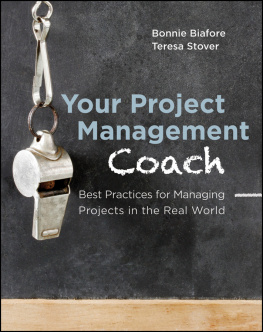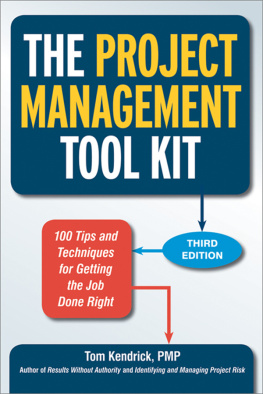APPENDIX A
Learning Resources
Recommended Reading
Dinsmore, Paul C. and Jeannette Cabanis-Brewin. The AMA Handbook of Project Management (AMACOM, American Management Association, New York, 2010).
Frame, J. Davidson. The New Project Management (Jossey-Bass, San Francisco, 2002).
Kerzner, Harold. Project Management: A Systems Approach to Planning, Scheduling, and Controlling (10th Edition) (John Wiley & Sons, New York, 2009).
Lewis, James P. Fundamentals of Project Management (AMACOM, American Management Association, New York, 2006).
Meredith, Jack R. and Samuel J. Mantel Jr. Project Management: A Managerial Approach (7th Edition) (John Wiley & Sons, New York, 2009).
PMI Standards Committee. A Guide to the Project Management Body of Knowledge (PMBOK Guide) (Project Management Institute, Newtown Square, Pennsylvania, 2008).
Richman, Larry. Improving Your Project Management Skills (AMACOM, American Management Association, New York, 2010).
Richman, Larry. Project Management Step-by-Step (AMACOM, American Management Association, New York, 2002).
Organizations
Project Management Institute (PMI) (14 Campus Boulevard, Newtown Square, PA 19073-3299 USA, phone: 610-3564600, ) establishes project management standards, provides seminars, educational programs, and the PMP professional certification. Founded in 1969, this professional organization has over a half million members and credential holders from over 170 countries.
International Project Management Association (IPMA) (P.O. Box 1167, 3860 BD Nijkerk, The Netherlands, phone: +31 33 247 3430, ) is a nonprofit organization founded in 1965 that is an international umbrella organization for national project management associations from over forty countries worldwide. It represents its members on the international level. IPMA provides standards and certification programs.
American Management Association (1601 Broadway, New York, NY 10019, phone: 877-566-9441, and podcasts, conferences, books, white papers, articles, and more. AMAs publishing arm, AMACOM, is one of the worlds largest publishers of books on project management.
George Washington University, in association with Educational Services Institute (phone: 202-994-1212, e-mail: ), offers a Master of Science degree in project management.
University of Phoenix (phone: 866-766-0766, www.phoenix.edu) has campuses in many states and online programs. It offers a Bachelor of Science degree in project management.
ProjectWorld (phone: 888-670-8200, www.ProjectWorld.com) hosts events that combine a practical education in project management with a world-class exposition hall to meet the needs of todays project and business professionals.
Websites
American Management Association, www.amanet.org
Project Management Institute, Inc., www.pmi.org
The Standish Group International, www.standishgroup.com
Gantthead.com, www.gantthead.com
PMboulevard, www.pmboulevard.com
@task, www.attask.com
Whatis.com, whatis.techtarget.com
The Improvement Encyclopedia, www.syque.com/improvements/a_encyclopedia.htm
Value Based Management.net, www.valuebasedmanagement.net
Project Management Center, www.projectman.org/
Project Connections, www.ProjectConnections.com
ProjectManagement.com, www.projectmanagement.com
PM Forum, www.pmforum.org
APPENDIX B
Glossary
Activity. A unit of work performed during a project. An activity usually has a duration, a cost, and resource requirements. Also called task.
Activity estimate sheet. A form used to gather information needed to estimate a project activity.
Activity-on-node. A diagramming method that shows the activities in a node (box) with arrows showing the dependencies. Also called precedence diagramming method.
Actual cost (AC). The cost incurred to complete the work that was actually performed in a given time period. Also called actual cost of work performed (ACWP).
Alternative course of action review. A review to identify other things that could be done to solve the problem or take advantage of the opportunity instead of the approach being taken by the proposed project.
Analogous estimate. A method of estimating that uses the actual costs and durations of previous, similar projects as the basis for estimating the current project. Also called top-down estimating.
Baseline. The original schedule or cost plan for the project, including approved changes. This is the basis from which actual performance is measured to determine variances.
Benchmarking. The process of defining a standard or point of reference to measure quality or performance.
Bottom-up estimate. A method of estimating that sums the cost and duration of the individual work packages.
Budget at completion (BAC). The estimated total cost of the project when completed.
Budgeted cost of work performed (BCWP). See earned value (EV).
Budgeted cost of work scheduled (BCWS). See planned value (PV).
Budgeting. The process of allocating the cost estimates to work items to establish a cost baseline for measuring project performance.
Cause-and-effect diagram. A graphical representation of the relationships that exist between factors. Used to explore a wide variety of factors and the relationships among them that may cause them. Also called a fishbone diagram.
Change control. A formal process to manage proposed changes to the project plan. Includes processes for submitting, evaluating, approving, and communicating changes.
Client. The person or group that requests a project.
Conceptual review. A review to determine whether the project fits within the organizations goals and whether the project will solve the stated problem or appropriately take advantage of the current opportunity.
Contingency plan. A plan that describes the actions to be taken if a risk event should occur.
Contingency reserve. See reserves.
Contract, cost-plus. See cost-plus contract.
Contract, cost-reimbursable. See cost-plus contract.
Contract, firm-fixed-price. See fixed-price contract.
Contract, fixed-price. See fixed-price contract.
Contract incentives. Additional payments included in contract terms, such as completing work before a given date or controlling costs to a given level.
Contract, time-and-materials. See cost-plus contract.
Control charts. Graphs that display periodic results along with established control limits. They are used to determine whether a process is in control or in need of adjustment.
Cost. The money and resources required to complete a project.
Cost budgeting. See budgeting.
Cost control. The process of comparing actual expenditures to the baseline cost plans to determine variances, evaluate possible alternatives, and take the appropriate action.
Cost performance index (CPI). A ratio that measures cost efficiency by comparing budgeted costs to actual costs. In earned value analysis, the budgeted cost of work performed divided by the actual cost of work performed.






